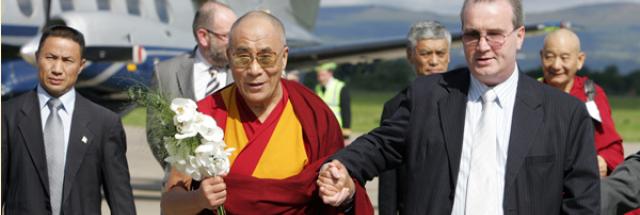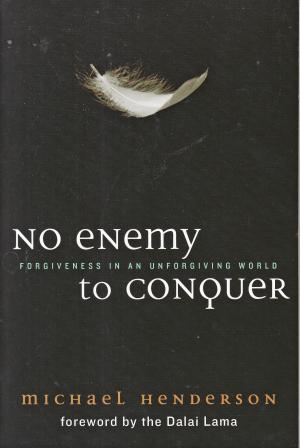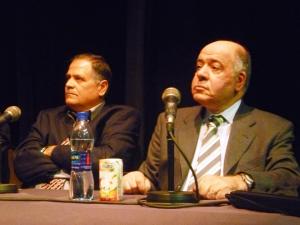Enemy leaders in new battle for peace
The two militia leaders – Christian and Muslim - are lucky to be alive. In a battle for a seafront hotel during the Lebanese civil war they were on opposite sides. Mohieddine Chehab, a fighter in a Sunni leftist militia, led his men up a staircase littered with corpses while Assaad Chaftari, an artillery commander of the Christian militia, was on a top floor shooting at anyone who moved. The two men could have been among the numerous combatants who fell that day, but recently they sat together in a Washington restaurant, and were, as one reporter described it, ‘completing each other's sentences as they discussed how they had learned to accept their differences and embrace their likenesses'.
Today Chehab is mayor of a part of Beirut and Chaftari is a small company manager.
The story goes back nearly thirty years to a time when a young Christian lawyer, Ramez Salame, decided to take stock of his life, putting right what was wrong, and to accept the daily discipline of listening for God's guidance. He returned library books he had intended to keep, and found a new frankness in his family through asking forgiveness from his father for his hatred and from his brother for his jealousy. As he took these steps he began to get ideas for his country, and, in the midst of the civil war, felt that he was not fighting the right battle.
‘In a moment of prayer, I believed God was telling me that he had a more important role for me to fulfil than to engage in the military fight.' He gave up his gun and courageously began having conversations with his Muslim compatriots. As a token of a new approach he sought out the Mufti, the leader of the Muslim Sunni community, to apologize for the way the Christians had conspired to keep the reins of power in their hands, not permitting the Muslims to be fully responsible for the country. He told the Mufti that he wanted to accept the changes in his own life which would help create a new Lebanon. The Mufti rose and shook his hand: ‘What you say is one ray of light in the present darkness. Thank you.'
It was then that Salame began to bring together groups of Lebanese, wherever possible both Muslims and Christians. ‘Dialogue is a powerful weapon which unfortunately is little used,' he says. ‘After our first meeting we felt joy in our hearts; we saw the beauty in the other person. We saw our enemy had fears like our fears, aspirations like ours. We grew in love and appreciation of each other.'
It was at such meetings that Chaftari began to find a new thinking. Out of these encounters came his decision in February 2000 to apologize through the main Lebanese newspaper Al-Nahar newspaper for what he did to his Muslim adversaries in the name of Christianity. Charles Sennott, writing in the Boston Globe , said that Chaftari ‘stunned Lebanon with a statement extraordinary in its simplicity and honesty.'
Explaining his action later, Chaftari said he had regarded Muslims as traitors because they looked towards the Arab world and he looked toward the West. ‘We were conservative, democratic Christians and we felt superior to Muslims and Palestinians.' As deputy intelligence director of the Christian militia he ruled over the fate of captives. ‘I became the policeman, judge and executioner. It was up to me if they were killed, exchanged for others or used to bridge intelligence gaps. If they killed four of us, it was my duty to inflict more harm in our retaliation. I had lost my sense of humanity'
Chaftari says that ‘after a week full of mischief I could go to church on Sunday at ease with myself and with God'. However, he had come across this forum for dialogue between Christians and Muslims and recognized the human being in them he had forgotten about through the civil war. ‘I discovered that my behaviur was very far from God, that it was no use trying to change the world if I did not start changing my own life and having God first.'
In his apology to his war victims, he asked for forgiveness and promised to try with God's help to do any reparation he could. ‘I decided to get rid of my prejudices, jokes and contemptuous attitude against the Muslims. As a Christian, my culture had to follow me, not the opposite.'
He repeated this apology that summer at a peace-building conference in Caux, Switzerland . Following him to the platform Mayor Chehab apologized for atrocities he had committed as a leader of the Muslim militia in the civil war. When the fighting stopped fifteen years ago he had started visiting Christian villages. He would get into conversations hoping that the Christians would say negative things about Muslims so that he could justify his past actions. But this rarely happened. ‘We were so deluded. I have met such decent people who have feelings, fears, nagging worries like us. I looked at my children. I knew what happened to us, but what about them?'
In Beirut there is a garden of forgiveness. It is a symbol of this growing readiness on the part of Lebanese to take a fresh look at the past. In November 2005 Chaftari and Chehab were invited by the initiator of the garden, Alexandra Asseily, to meet in her home with New York women who had lost members of their immediate family in the 9/11 attacks.
Both men told their remarkable and often horrifying stories. Chehab described how in 1983 he was about to kill two US prisoners after a US ship, the New Jersey, shelled West Beirut with a terrifying bombardment and saw his mother terrified and shaking. His mother pleaded with him not to do it. He didn't, and exchanged them for prisoners instead.
An American CEO, one of seven who accompanied the women, went up to Chehab afterwards and said, ‘I was stationed aboard one of the US navy ships off the coast. I want to ask your forgiveness - not for my hate, but for my indifference at that time to the suffering of your mother and the people of Beirut .' A n American woman who had lost her son, a New York fireman, also came up to him in tears, hugged him and told him, 'Now, I am able to really forgive.'
It has been a long journey for these two Lebanese to move from hatred and prejudice to a determination to work together to address Lebanon 's problems. They give hope to others that fruitful dialogue is possible. ‘The Lebanese people are making peace with themselves,' says Chaftari. ‘They have been slowly walking back from the brink. That's what I did.'
This story is from chapter 1 of No Enemy to Conquer



